Civil Court is not competent to either ignore or reverse the order passed by Consolidation Officer once it has attained finality: Top Court explains scope of section 37 of Bihar Consolidation Act
Justices Pankaj Mithal & Prasanna B. Varale [01-05-2024]

Read Order: RAM BALAK SINGH v. STATE OF BIHAR AND ANR [SC- CIVIL APPEAL NO. 1627 OF 2016]
LE Correspondent
New Delhi, May 2, 2024: The Supreme Court has clarified that a civil suit for declaration of rights in respect of land, where the Consolidation Court has already passed an order recognizing a party's rights, is not barred by Section 37 of the Bihar Consolidation of Upholdings and Prevention of Fragmentation Act, 1956 (Consolidation Act).
The dispute in the suit was regarding 0.32 decimal of land situated in Bihar's Kishanpur village. This area of land was carved out from a plot which belonged to Rambati Kuwer, the ex-landlord/ The ex-landlord settled the above area of the suit land in favour of one Makhan Singh whereupon the said Makhan Singh continued in possession of it during his lifetime and the adopted plaintiff-appellant who in-herited the suit land after Makhan Singh.
Accordingly, plaintiff-appellant has presently been in possession of the suit land. The village was brought under consolidation in accordance with the Bihar Consolidation of Upholdings and Prevention of Fragmentation Act, 1956 (Consolidation Act).
Since the aforesaid land was incorrectly recorded in the name of the State, the plaintiff-appellant in accordance with Section 10(B) of the Consolidation Act applied for the correction of revenue/consolidation records. The name of the plaintiff-appellant was directed to be recorded. Subsequently, the State Authorities started claiming the entire land as pond land which included the suit land also and thus allegedly started interfering in the possession of the plaintiff-appellant.
The Division Bench of Justice Pankaj Mithal and Justice Prasanna B Varale was considering the plaintiff’s appeal arising out of a suit for possession and confirmation of his possession over the suit land which was decreed in his favour by the court of first instance but the decree was set aside in First Appeal and was affirmed by the High Court. The court of first instance on the basis of the evidence both documentary and oral adduced by the plaintiff-appellant decreed the suit and held him to be the owner in possession of the suit land.
The moot question which arose for consideration was whether in view of the bar imposed under Section 37 of the Consolidation Act, the order of the Consolidation Authority confirming the title of the plaintiff-appellant over the suit land and directing for recording his name in the record of rights under Section 10(B) of Consolidation Act, was liable to be reversed or ignored by the Civil Court.
Referring to the Act, the Bench explained that all matters relating to changes and transfers affecting any rights or interests recorded in the register of land may be raised before the Consolidation Officer within the time prescribed and the disputes in this regard once decided cannot be reopened on the publication of the register.
“Under the scheme of the Consolidation Act, the consolidation authorities are fully competent to deal with the issue of title over the land under consolidation except under certain contingencies. Thus, the consolidation authorities have the powers of the Civil Court to decide the question of the title subject to the judicial review by the High Court under Articles 32, 226 and 227 of the Constitution of India. In other words, the consolidation authorities have the status of the deemed courts and have the powers akin to the Civil Courts to decide the rights and title of the parties over the land under consolidation and, at the same time, oust the jurisdiction of the Civil Court”, the Bench said.
It was opined that revenue entries are not documents of title and do not ordinarily confer or extinguish title in the land but, nonetheless, where the revenue authorities or the consolidation authorities are competent to determine the rights of the parties by exercising powers akin to the Civil Courts, any order or entry made by such authorities which attains finality has to be respected and given effect to.
The Top Court was of the view that the rights of the parties over the suit land stood crystalised with the passing of the order by the Consolidation Officer which became final and conclusive. The State of Bihar never challenged the said order and it was not its case that the aforesaid order had been obtained by concealment of facts or by playing fraud upon the consolidation authorities.
“In view of the above, when the rights of the plaintiff-appellant have been determined and recognised by the consolidation authorities, the order of the Consolidation Officer to that effect in favour of the plaintiff-appellant could not have been ignored by the Civil Court. The jurisdiction of the Civil Court in respect of the rights determined by the Consolidation Officer stands impliedly excluded by the very scheme of the Consolidation Act”, the Bench said while adding that the appellate courts below completely fell in error in holding otherwise discarding the order of the Consolidation Officer which was sacrosanct as to the rights in respect to the suit land.
The Top Court further asserted, “Insofar as, the bar of Civil Court imposed by Section 37 of the Consolidation Act is concerned, a plain reading of the said provision would reveal that the Civil Court is prohibited from entertaining any suit to vary or set aside any decision or order of the Consolidation Court passed under the Act in respect of the matter for which the proceedings could have or ought to have been taken under the Consolidation Act.”
Even though there was no necessity on the part of the plaintiff-appellant to have instituted any civil suit for declaration of his rights over the suit land inasmuch as his rights over the same stood determined by the Consolidation Court, nonetheless, a suit was filed by him was not barred by Section 37 of the Consolidation Act, as it did not propose to challenge any order passed by the Consolidation Court under the Consolidation Act.
Restoring the order of the First Appellate Court, the Bench held, “Thus, our answer to the question framed in paragraph 12 above is that a civil suit for declaration of rights in respect of land where the Consolidation Court has already passed an order recognizing the rights of one of the parties is not barred by Section 37 of the Consolidation Act and that the Civil Court is not competent to either ignore or reverse the order passed by the Consolidation Officer once it has attained finality.”
Sign up for our weekly newsletter to stay up to date on our product, events featured blog, special offer and all of the exciting things that take place here at Legitquest.




Add a Comment